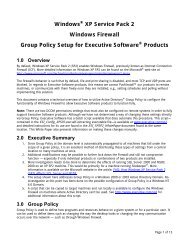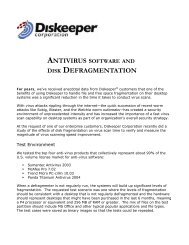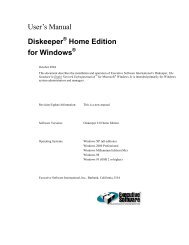Diskeeper 10 User's Manual
Diskeeper 10 User's Manual
Diskeeper 10 User's Manual
Create successful ePaper yourself
Turn your PDF publications into a flip-book with our unique Google optimized e-Paper software.
14 Overview of <strong>Diskeeper</strong><br />
defragmentation alone. This is the first industry implementation of “Disk Performance Calibration”, the modern<br />
evolution of the outdated and inconclusive disk optimization strategies of the past.<br />
Exclusion Lists—<strong>Diskeeper</strong> exclusion lists allow you to specify files and directories that will not be allowed to<br />
be processed by <strong>Diskeeper</strong>.<br />
Event Logging— <strong>Diskeeper</strong> records information about its activity in two ways. First, general information<br />
about previously-run defragmentation job is shown in the Job Log tab within the <strong>Diskeeper</strong> console. Additional<br />
information can also be stored in a log file. A wide variety of information can be saved for future reference.<br />
Simultaneous Analysis or Defragmentation Operations—You can analyze and/or defragment more than one<br />
disk volume at a time. Different <strong>Diskeeper</strong> editions support different numbers of simultaneous operations. See<br />
Appendix A for more information.<br />
Boot-Time Defragmentation—Defragment files at boot-time that cannot be moved safely when Windows is<br />
running.<br />
Group Policy Support—<strong>Diskeeper</strong> can be configured network-wide with the Group Policy Editor provided<br />
with Windows 2000 Server and Windows Server 2003.<br />
Other Things to Know<br />
• When running <strong>Diskeeper</strong> in the Set It and Forget It or <strong>Manual</strong> Defragmentation modes, you can run other<br />
tasks while defragmentation is occurring.<br />
• When <strong>Diskeeper</strong> runs at higher priority levels, performance of other active processes will usually be<br />
affected.<br />
• When <strong>Diskeeper</strong> runs at lower priority levels, defragmentation may take longer, since <strong>Diskeeper</strong> "backs<br />
off" for higher-priority processes, including screen savers.<br />
• With the exception of boot-time operations, <strong>Diskeeper</strong> runs as a Windows Service and it optionally logs<br />
useful defragmentation information into either the Windows Application Event Log (under Windows NT,<br />
Windows 2000, Windows XP and Windows Server 2003) or to a text file (under Windows 98/Me).<br />
• <strong>Diskeeper</strong> can be uninstalled in the standard manner using the Add/Remove Programs applet in the<br />
Windows Control Panel.<br />
• Due to limits built into the Windows NT/2000 file systems, <strong>Diskeeper</strong> cannot defragment files on NTFS<br />
volumes with a cluster size greater than 4KB (4096 bytes), except during Boot-Time Defragmentation.<br />
This limitation has been removed in Windows XP and Windows Server 2003, where <strong>Diskeeper</strong> can<br />
defragment NTFS volumes with cluster sizes of up to 64 kilobytes. Note the boot-time defragmentation<br />
operations are not affected by this limit.<br />
• You must be logged into an account that is a member of the Administrators group to run <strong>Diskeeper</strong> on<br />
Windows NT, Windows 2000, Windows XP and Windows Server 2003 systems.<br />
• <strong>Diskeeper</strong> relies on the Microsoft Management Console (MMC), which is available for Windows 98. The<br />
MMC is built into Windows 2000, Windows XP and Windows Server 2003. For more information about<br />
the MMC, see the Glossary.<br />
Exclusion List<br />
In some cases, you may have files or directory folders you do not want to defragment. For example, you may<br />
not want to defragment temporary files that will soon be deleted. Any files or directories can be excluded from<br />
<strong>Diskeeper</strong> processing by adding them to the exclusion list.<br />
For more information, see page 42.






